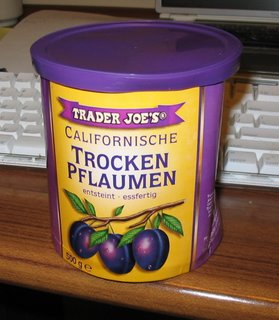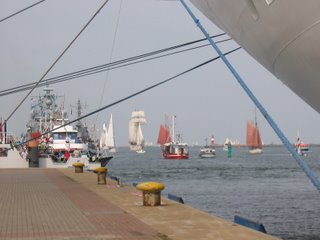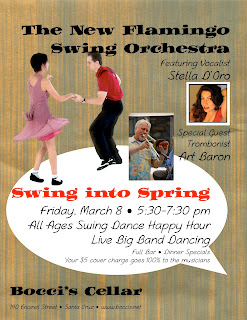
It’s March 27, 2013, and moments ago I noticed on my iPad that my credit union had posted a deposit for my first Social Security check since 1973, when I got my last green check from survivor benefits from my father’s account.
I went through college on those green checks, just up the hill from where I live now. I had entered UCSC as an emancipated minor, self supporting though, courtesy of a California State Scholarship, one who didn’t have to worry about fees, which were just $229.50 a quarter at the time. All I had to worry about was care and feeding—renting a room and buying groceries—and that’s where the green checks came in.
It's been a long and eventful 40 years between Social Security payments, during which I paid into the system, more so than most of the musicians I know. I had nonmusical careers that operated strictly within the system, and I looked at the small deductions as just a part of the game. Some of the lines of work were . . .
Waiter in an Ice Cream Parlor
Sonny was connected, or so I thought. He owned an ice cream parlor called The Ice Cream Parlor in the town back east where I worked when I was sixteen. Noreen, my sister, worked there when she was fifteen, also waiting tables. I’ll not mention the town for fear of retribution. That’s the kind of guy Sonny was, and perhaps is still.
Unloader/Loader of Trucks
I went down to Santa Ana the summer between my freshman and sophomore years at UCSC, My best buddy from high school had dropped out of UC Berkeley and his parents left him the house for the summer, so I moved in with him and a couple blokes and started working right away at the trucking company where he was working. Every night we unloaded freight from trucks, sorted the freight in a warehouse, and loaded the sorted freight into empty trailers. We also tested the patience of the Costa Mesa Police Department by looking suspicious at 4 am while their new helicopter was flying.
Baritone Saxophonist for Stan Kenton
“And then the phone rang.” I’d always herd that was how it would be, and that was how it was. The guy at the other end of the line was Dick Shearer, Stan’s crew chief, offering me a job.
Cab Driver in New York City
Nobody moves to New York to drive a cab, not even someone from Pakistan (who in all likelihood has advanced degrees in physics). But there you are, in New York, trying to find your way. You have no clue about the city’s layout, but you have a map, and you’ve just shelled out 40 of your last dollars to the Taxi and Limousine Commission for a license. You pick out a garage, and you’re in business. The first night on the job, a man and woman got into my cab, midtown. A car emerged from a Hertz garage and the guy told me, “Follow that car.” Guys drive cabs for a lifetime without hearing that one.

Baritone Saxophonist for Glenn Miller Orchestra
I was just getting myself into a comfortable pattern of driving the graveyard shift when it was disrupted by a couple of guys from the Glenn Miller band, who, on a rare night off, were listening to a band at a club called Stryker’s uptown. We chatted on the way to Times Square about life on the road, and when they were leaving the cab at their hotel I told them, “If you ever need a bari player, give me a call.” The Texan of the two, Laigh Langley, laughed and said, “Our bari player is on the third week of his two week notice.”
So off I went.
Temp Tech Employee in Orange County
I didn’t want to do this, but in the boomtown atmosphere that was Orange County in the seventies, you could walk into a temp agency and walk out with a job, sometimes a job that paid more than ten dollars an hour. I operated a machine that connected wires to pins of circuit boards—my first exposure to computers. I worked in the print shop at Cannon Electronics in Santa Ana (I used to deliver the afternoon paper to their guard shack when I was a kid), and they offered me a permanent job. I turned them down and moved to Venice to pursue musical opportunities which I mistakenly thought existed.
CETA Employee of Purr-Fect Printers
I had moved from Santa Cruz to southern California with the intention of getting work as a musician, but it always seemed like whenever I moved, things were great a couple months or a year ago, and it’s dry now. So with that in mind I applied for retraining through CETA, a scheme of the Ford administration to retrain chronically unemployed people with job skills that were in demand. I worked for Chuck Amadon, doing paste-up, ordering type, working the counter, and, eventually running a press. CETA kicked Chuck back several dollars of my hourly wage.
Printers Devil
Patrick Reagh was a piano player with whom I did a few salsa gigs, but he was also one of the best letterpress printers in the country, or he was getting there anyway. It was a long ride up the Olympic bus to his shop, but one look around the shop and I knew it was time to leave offset. I set type by hand, ran presses and casters and generally made myself useful.
Road Musician with the Modernaires and Helen Forrest
By this time I’d married, become a father, and moved to the Palms district of west Los Angeles. When an opportunity came up to go on the road with a very swinging band in the very non-winging month of January (back in mid-March) I jumped at the chance. But I missed my son’s first steps. So I hung up my spurs for a couple years.
Typesetter
Learning computer typesetting after working with metal type was a cinch, although there were employers in my intermediate years who didn’t think I was quite so adept. My first employer was Newport Stationers. We’d moved to Irvine by then, and I rode my bike to work most days on a great and underused bicycle path, a straight shot to the neighborhood of the Orange County (SNA) Airport. When I’d worked a year I thought I could make more money than they were willing to pay me, so I went with the Firm of Christopher Wren. (What kind of a name was THAT?) Gradually, I made a plan to go out on my own.
Owner of Typographic Business
I opened Ampersand & Company (makes more sense than calling your typesetting business the Firm of Christopher Wren) just as my daughter was being born. The business thrived with the change to PostScript. Desktop Publishing had zero effect on me, unlike my competition. After 4 years, family relations strained, and I was left with little alternative than to close and take the proverbial bath.
Graphics Manager for GES Exposition Services
After working for myself for five years I had no trouble at all setting up a print shop for Expo-Tech, the company where my sister worked. Moving the printing of forms in house saved them a ton of money, and the trade-off for me was I had a steady, reliable paycheck again. When Expo-Tech merged with GES I moved over to their office in Cerritos with Noreen. The thing I remember being most challenging about the job was napping after a night of gigging, my hand on the mouse and my back turned to the door in case anybody walked in.
Print Shop Manager
I managed a print shop in Austin, although the owner—who moved cocaine through the shop and was in a lot of legal trouble for mail fraud—had a tendency to override my decisions. It didn’t last long, and the business folded under the weight of the straw man the owner had selected to receive his assets. It got ugly, but by then I was long gone.
Author of several Macworld reviews and one Peachpit book
I copied a lot of music over the years, and when I ran into Marjorie Baer at a UCSC alumni function she asked me if I’d like to write some bylined reviews for Macworld magazine. When Marjie moved over to Peachpit Press, she asked me to write a book about Claris Home Page. The week the book was published, Steve Jobs was back to Apple. He pulled the plug on the product. Today you can buy a copy (all 5,000 printed were sold) for 1 cent on Amazon, but I got some pretty good reviews you can read on the Amazon listing.
Database Manager for South by Southwest
What can I say? I was the only practicing musician on the staff. I moved the staff. kicking and screaming, into relational databases. Far and away my favorite part of the job was when I was Doctor Demento’s handler at one of the festivals. With the crash in air traffic after 9/11, I was laid off.

Ship’s Musician for Princess Cruises
When I called Brian, the guy who hired the musicians for Princess, on his private line, and asked if there might be work for me, he hired me straight away. I worked in Alaska, the Caribbean, and the Baltic.

Ship’s Musician on QE2
Back to today. I spent most of the day watching YouTube videos of the QE2. Of all my jobs (and, admittedly, this is in hindsight, with her venerable hull in my rear view mirror) this one left the most deep impression on me. I knew going in that she had been sold to Dubai, and that she’d likely be suffering from her advanced age. The food was lousy, the English passengers of a certain age were bitter at her sale for “mere money,” my cabin was an odd L-shaped affair that did in fact have a porthole, and did I mention the food?
I may not be at the end of my working days. Big bands could in some odd way come back, which would suit me just fine. I’ll still be writing the charts for this band, and I’d drive the bus too, as Laigh Langley used to say.
But whatever happens in the future, I owe my employers a note of thanks for making all those payments on my behalf over the years. Now that I have reached sixty-two years with certain challenges to my health I am grateful that I can go to the Social Security website, apply for early retirement benefits, have one brief conversation with an officious Social Security employee, and, six weeks later, receive my first payment, a direct deposit to my credit union.
There’s still a liquor store in Santa Cruz called Bonesio’s. I used to buy booze there for various dorm and private functions from the time I arrived here in 1969. On my 21st birthday, I went to Bonesio’s and, selecting a gallon of Cribari and a six pack of Mickey's Big Mouth, went up to the counter with my purchases.
“You have to ask to see my ID,” I told my usual clerk. He did, and I showed him.
“Well, you could have fooled me,” he said as he rang me up.
“I have been,” I replied. "For the last three years."
Maybe tonight I’ll go down to Bonesio’s and tell the clerk he needs to ask for my ID. Again.





























